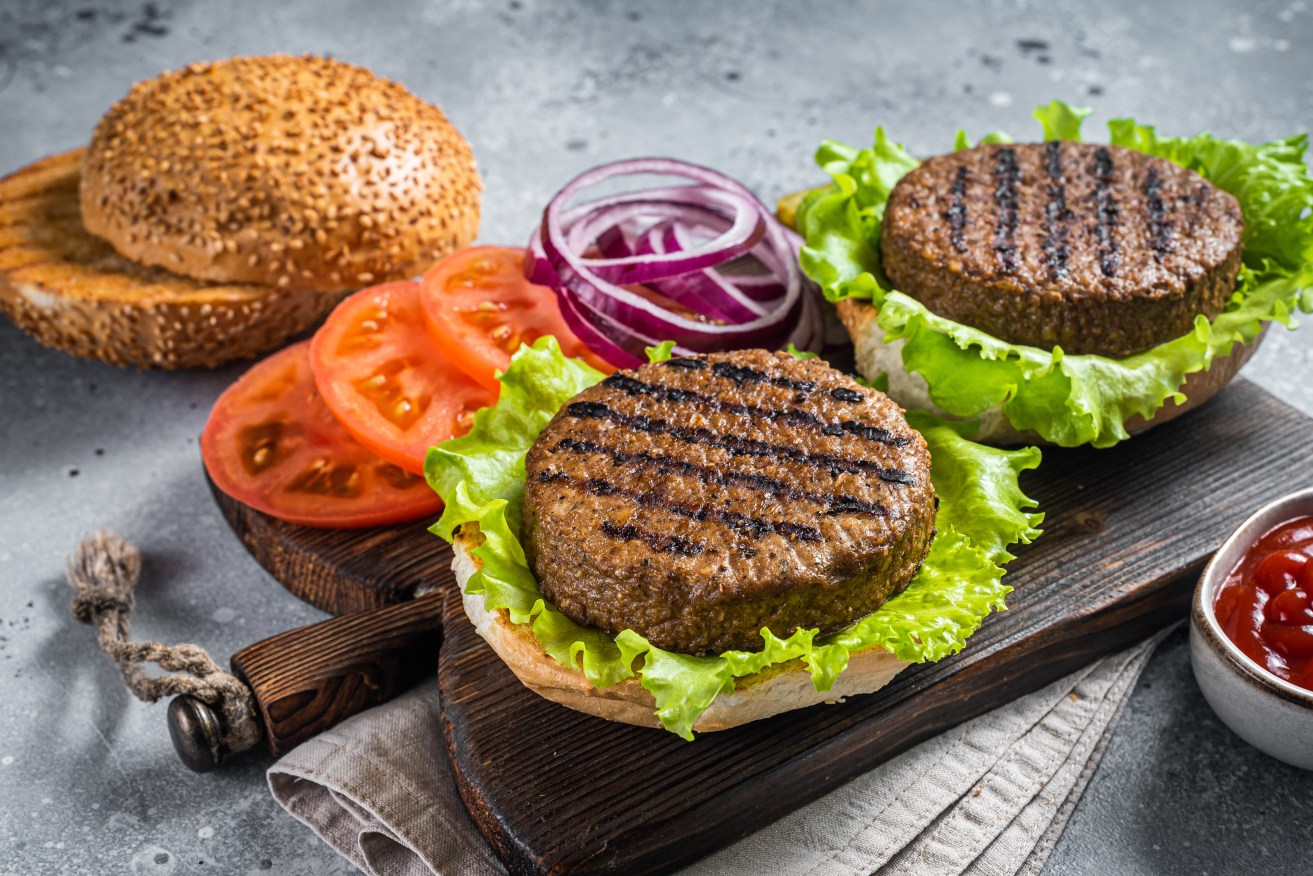Do you want extra salt with that? The problem with plant-based burgers


The meat-free alternative really is just like the real thing sometimes: with high salt and fat content. Photo: Getty
Cancer Council Victoria is the latest body to raise the red flag on meat-free burgers – finding that some brands aren’t so good for your blood pressure and risk of stroke.
In a council survey of 35 plant-based burger products sold in Australian supermarkets, “some contain more than the recommended daily sodium intake in just one patty”.
This might come as an unpleasant surprise to about 31 per cent of Australians who – according to the most recent annual Shape of Australia survey – say they “sometimes, often, or always” eat commercial plant-based products.
(The Cancer Council runs the survey.)
No animal heart stopped beating for the sake of their lunch … except possibly their own.
A quick word about salt recommendations
According to Food Standards Australian New Zealand, “governments recommend adults eat around 2000mg of sodium per day”.
That’s equivalent to about 5000mg or five grams of salt or one teaspoon.

A 2010-2019 survey found meat-free bacon was the saltiest category of plant-based foods.
Indeed, the federal Department of Health publishes that recommendation but advises:
“A target of 460 to 920mg per day (equivalent to 1.15 to 2.3g of salt per day) is the daily average intake that may help the Australian adult population prevent chronic disease – such as high blood pressure. It also aligns with World Health Organisation recommendations.
“It’s also OK to consume less than this.”
It’s this lower target that the Cancer Council refers to as a recommendation.
The Cancer Council name and shame findings
The Cancer Council found that “a single Wildly Good Kale Sweet Potato Burger patty contains over 1000mg of sodium”.
Wildly Good’s Original Veggie Burger took out second place with 846mg per patty – while Yumi’s Classic Veggie Burger came in third with 788mg.
That won’t mean much to many people – but the study serves as promotional tool for the Cancer Council’s LiveLighter program, which is running a campaign promoting less salt intake, with some useful practical advice.
LiveLighter Victoria’s campaign manager and accredited dietitian, Sherly Li, says that many Australians are unaware of the high salt content in commercial plant-based products.

Wildly tasty, but a little heavy on the salt, says Cancer Council Victoria.
Ms Li said: “Many people choose plant-based products because they are presented to be a healthy non-meat alternative, without realising that some of these products are highly processed and packed with salt.”
“Our bodies need some sodium to function, but we need to be careful about how much we are consuming. Having too much sodium in your diet can increase the risk of several serious illnesses, including high blood pressure, heart disease and stroke.”
The word’s been out for a while
In 2019, The George Institute surveyed 564 meat alternative products between 2010 and 2019.
During that time, there was a 153 per cent increase in the number of meat alternatives on the market.

Vegan sausages may not be much healthier than the pork kind. Photo: Getty
Although there were emerging concerns about the sodium content in these products, “there was no change in the sodium content of meat
alternatives” during the survey period. Meaning, these products stuck with their formulas.
The institute found the average sodium content of meat alternatives per 100g was 379mg (nearly a gram of salt).
The sodium content ranged from 1mg to 1260mg (a falafel product, significantly outdoing Wildly Good’s salty efforts).
The George found the category with the highest average sodium content per 100g was meat-free bacon (818mg sodium or two grams salt).
Second place went to falafels (519mg sodium, 1.3 grams of salt).
Third place to meat-free sausages (506mg, or 1.3 gams of salt).
Not just the salt
Most people choose plant-based meats for the sake of their health, the planet and the life expectancy of livestock.
They’re all big issues.
For human health, plant-based meats are a mixed bag. Some brands have as much saturated fat as the real thing. The fat is loaded to give the product a life-like texture.
Soy products tend to be superior for your health, but many plant-based meats are essentially the product of a chemistry set. The bid for more flavour means that many of these products are highly refined, which throws their claims to health out the window.
As I’ve repeatedly reported, highly refined foods (convenient and long lasting on the shelf) are driving the obesity epidemic and the rate of some cancers.
For a great explainer, check out this Conversation article from August, co-authored by Dr Katherine Livingstone, a senior research fellow at the Institute for Physical Activity and Nutrition, Deakin University.
As Dr Livingstone told The New Daily: “We can’t assume that plant-based proteins are a healthier alternative to meat. The reality is that these products vary considerably in their nutrition content.
“Yes, some plant-based products are lower in calories and saturated fat, but not all of them. In fact, some plant-based proteins are considerably less healthy than meat because of high saturated fat and sodium levels.”
What’s more, she said, plant-based proteins undergo a high degree of industrial processing, and often include additives to make them taste better and look like meat.
“So if consumers are looking for an alternative to meat, whole plant foods, such as canned legumes, are a much healthier option,” she said.








